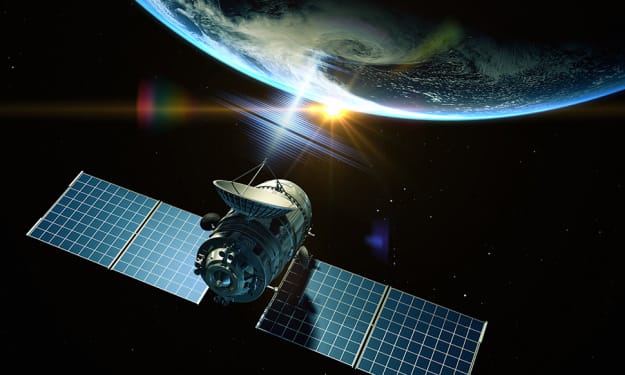"The Lunar Shuffle: Exploring the Ramifications of a Closer Moon"
What Would Happen If The Moon Moved Closer To Earth?

Imagine looking up at the sky and seeing a giant moon, much larger than usual. It's both beautiful and scary. What would happen if the moon moved twice as close to Earth as it is now? Unfortunately, it would be a catastrophic scenario.
The moon has a strong gravitational pull on Earth's oceans, producing two high tides and two low tides per day. However, with the moon so close, the tides would get eight times higher. Some regions would be completely covered with water during the day, and the water would only retreat at night. Many islands and highly populated coastline territories would become uninhabitable, and many other regions would experience frequent devastating floods.
But that's not all. The moon also has a tidal effect on dry land, meaning if our planet's natural satellite suddenly relocated, its gravitational pull would increase. This would trigger energy waves throughout the planet, affecting Earth's crust, and triggering earthquakes and volcanic eruptions.
Moreover, Earth's spin would start to slow down over time. The moon’s gravity pulls the oceans, and this friction between the water and the ocean floor slows Earth's spin. Even now, Earth's rotation is slowing at a thousandth of a second per century. If the moon were twice as close, the rotation of our planet would slow much more, making days and nights longer.
But what if it wasn't an overnight occurrence? What if it were a gradual shift? Tides wouldn't be as dramatic, and living creatures could adjust to the new conditions over time, as longer days and nights would require animals to evolve and adapt.
If people managed to survive the unexpected earthquakes, high tides, and volcanic eruptions and got used to longer days and nights, they would get to experience more frequent solar eclipses, where the moon covers a much larger area in the sky. These eclipses would last much longer, and people would be able to see the sun's outer atmosphere, called the corona. But what catastrophe could lead to the moon moving closer to Earth?
One possibility could be a massive object, such as a giant asteroid, passing close to the Earth-Moon system. If the moon were in the way, it could take energy from Earth's satellite, which would cause the moon to spiral towards our planet.
The moon's relocation would have consequences for science, too. The Earth's natural satellite is a reference point to determine the age of other planets and entire worlds in space. The moon helps determine the chronology of the life of the whole solar system, making it essential for space exploration.
All we can do is wait for new and exciting research as scientists keep studying the moon and our solar system to unravel its mysteries.
Moreover, the moon is a natural satellite of the Earth and has been in a stable orbit for billions of years, but what would happen if the moon moved twice as close to the Earth as it is now? The thought of such a scenario is quite catastrophic, and it raises a lot of questions. In this article, we examine some of the potential effects of a closer moon and what it would mean for our planet.
The moon's gravity causes tides in the Earth's oceans, producing two high tides and two low tides per day. However, if the moon were to move closer, the tides would get much higher. Some regions would be completely covered with water during the day, and the water would only retreat at night. Many islands and coastline territories would become uninhabitable, and other regions would experience frequent devastating floods.
But it's not just the oceans that would be affected. The moon's gravity also has a tidal effect on dry land. If the moon were to suddenly relocate, its gravitational pull would increase, creating waves of energy throughout the planet. These waves would affect the Earth's crust, triggering earthquakes and volcanic eruptions.
Earth's rotation would also change if the moon were to move closer. The moon's gravity slows Earth's spin, resulting in days that are getting longer. Even now, the Earth's rotation is slowing at a rate of around a thousandth of a second per century, but with a closer moon, this rate would accelerate, making days and nights longer.
If the moon's relocation were a gradual shift, tides wouldn't be as dramatic, and living creatures could adapt over time to the new conditions, such as longer days and nights. Animals would have to evolve and adjust to the changes, and some species would thrive, while others wouldn't survive.
However, if the moon moved closer overnight, the effects would be more extreme. People would have to adapt quickly to unexpected earthquakes, high tides, and volcanic eruptions. They would also experience more frequent and longer solar eclipses, which would be a spectacle to behold.
One possibility of the moon moving closer to the Earth is a collision with a massive object, such as a giant asteroid. If the moon were in the way of such an object, it could take energy from Earth's satellite, causing it to spiral towards our planet.
The moon is also essential for space exploration. It's a reference point to determine the age of other planets and worlds in space, helping researchers understand the chronology of our solar system.
Therefore, the relocation of the moon could have catastrophic consequences for our planet due to the large changes in tides, earthquakes, volcanic eruptions, and longer days and nights. However, if the relocation were gradual, living creatures could adapt over time. The moon is also essential in determining the chronology of our solar system, making it crucial for space exploration.






Comments
There are no comments for this story
Be the first to respond and start the conversation.